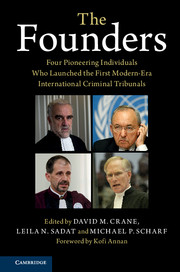 The Founders
The Founders 5 - The Special Court for Sierra Leone
from PART II - THE FOUNDERS
Published online by Cambridge University Press: 23 March 2018
Summary
I sat at my desk surveying my office. It was clean and empty. It was June 30, 2005. I was leaving for home after three years in West Africa. It was a time of great emotion as I reflected back on those years. This was my last day as chief prosecutor for the world's first hybrid international war crimes tribunal called the Special Court for Sierra Leone. It had been an amazing and historic effort on the part of my team of prosecutors, investigators, paralegals, administrative staff, and even my close protection officers who kept me safe. The entire week had been one of recognition and celebration. Just yesterday I had been made an honorary paramount chief by the Civil Societies of Sierra Leone, replete with robes and other accoutrements.
I was torn on whether I should leave. It was time to go, my work had been done, and the trials of all of the heads of the warring factions in the horror that was the civil war in Sierra Leone were moving forward and largely completed. My prosecution plan was working with an excellent team of trial counsel presenting our cases. I had been away from home too long. My family needed me. Yet my heart was with my client … the people of Sierra Leone.
There was a gentle knock on my door and my dear friend and deputy chief prosecutor, Desmond de Silva, came in. “It's time David,” he said softly. Desmond was succeeding me as chief prosecutor.
I got up and followed him out the door, glancing back one more time. My close protection security detail closed in around me as I headed for my car to be taken to the heliport at United Nations headquarters on Lumley Beach. It was raining softly. The air was heavy and close, with the all too familiar smells of smoke, diesel fuel, and garbage. It clung to me, enveloped me almost as if to say goodbye. I would not miss the feeling nor the stench.
- Type
- Chapter
- Information
- The FoundersFour Pioneering Individuals Who Launched the First Modern-Era International Criminal Tribunals, pp. 74 - 93Publisher: Cambridge University PressPrint publication year: 2018


